Contents
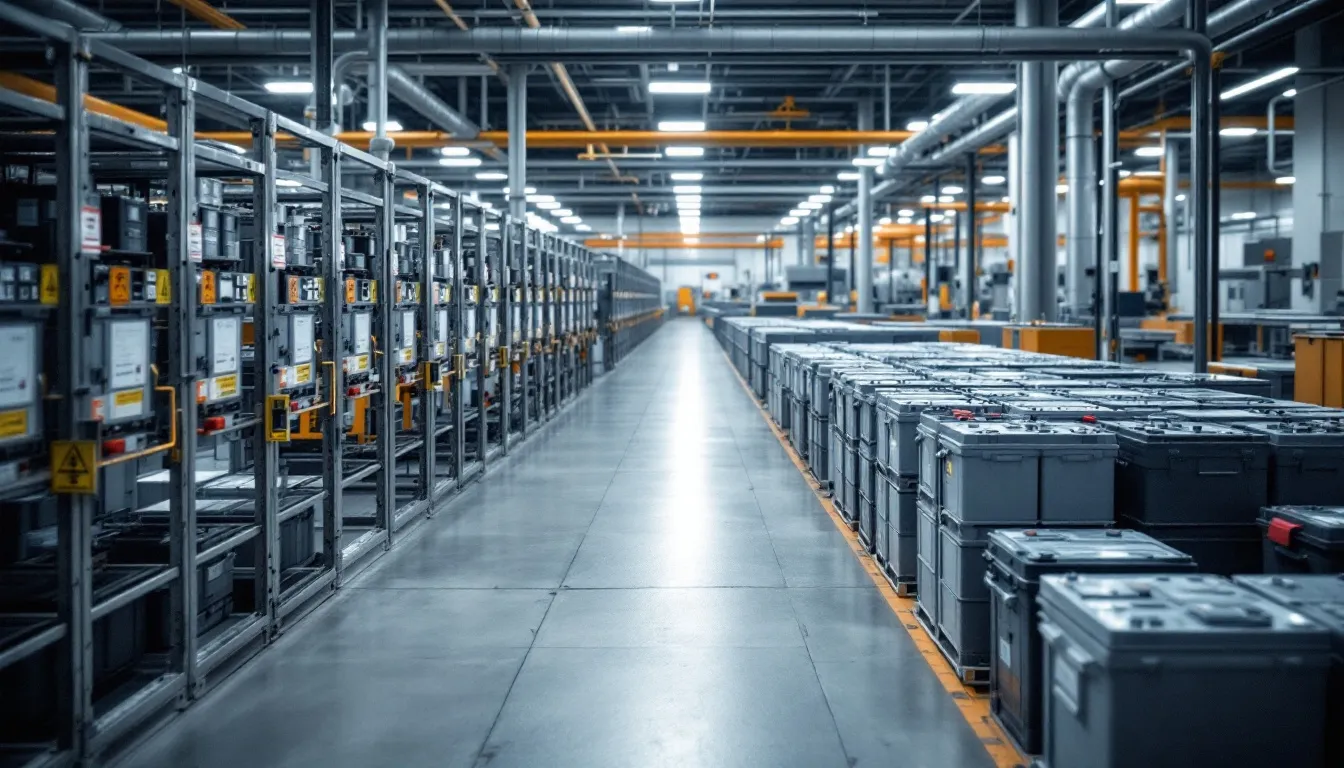
What Are Industrial Batteries?
Industrial batteries, including lithium batteries, are specially designed energy storage devices built to power heavy machinery, backup systems, and grid-scale installations under harsh operating conditions. Unlike consumer batteries—optimized for low-power, intermittent use—industrial batteries deliver sustained high currents, withstand deep discharge cycles, and tolerate vibration, shock, and temperature extremes
Key Characteristics of Industrial Batteries
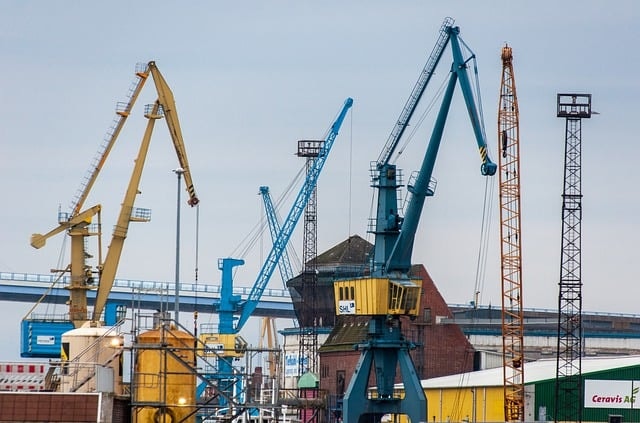
1. High Durability and Robustness
Industrial cells are constructed with reinforced casings and advanced separators to resist vibration, shock, and mechanical stress in demanding applications like forklifts or construction equipment.
Regular battery maintenance is crucial to ensure the longevity and reliability of industrial batteries. With proper maintenance, these batteries typically last 5-10 years, making them a durable and cost-effective solution for industrial applications.
2. Deep-Cycle Capability
They support repeated deep-discharge and recharge cycles—often exceeding 1,000 cycles—without significant capacity loss, ensuring long service life in UPS and telecom backup applications that users can count on. Industrial batteries generally have a cycle life ranging from 500 to 1500 cycles, depending on the specific chemistry and usage conditions.
3. Wide Temperature Tolerance
Custom chemistries (e.g., NiCd, LiFePO₄) enable reliable operation from sub-zero cold-storage to high-heat industrial environments, minimizing performance degradation.
4. Integrated Battery Management
Advanced Battery Management Systems features—cell balancing, real-time diagnostics, and thermal monitoring—enhance safety, prevent overcharge/overdischarge, and extend cycle life. Innovation in battery management systems further enhances safety and extends cycle life by incorporating cutting-edge technologies.
Common Types of Industrial Batteries
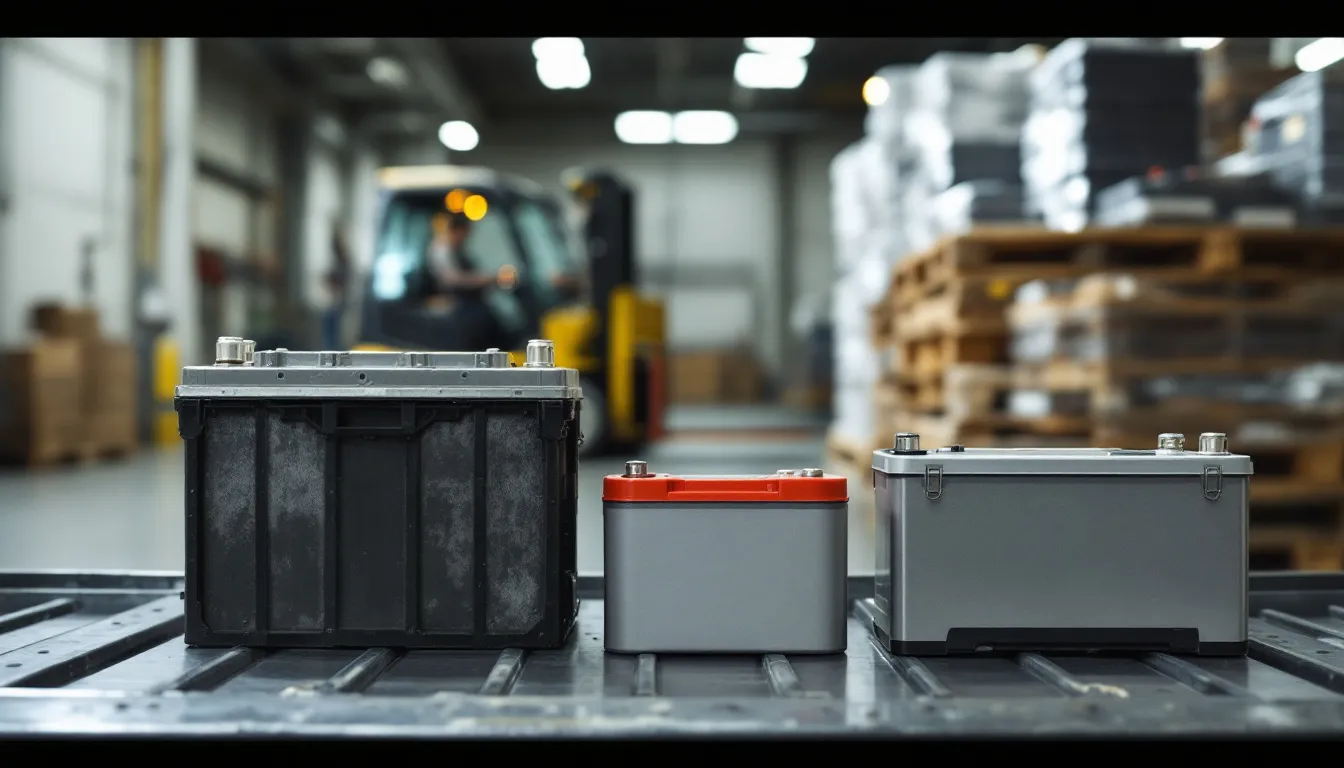
Lead-Acid Batteries
Widely used for commercial traction (forklifts, floor scrubbers) and backup power (UPS), thanks to low upfront cost and proven technology. Industrial batteries usually cost between $200 and $2000 or more, depending on their size, chemistry, and application.
Nickel-Cadmium (NiCd) Batteries
Highly rugged, capable of ultra-fast charging and extreme temperature endurance, making them suitable for aviation, aerospace, and critical medical equipment. NiCd batteries play a crucial role in electrification in critical applications like aviation and aerospace.
Lithium-Ion Batteries
Increasingly popular for high-energy-density applications—grid storage, robotics, electric vehicles—offering up to 20-year lifespans and superior energy-to-weight ratios.
Industrial Battery Applications
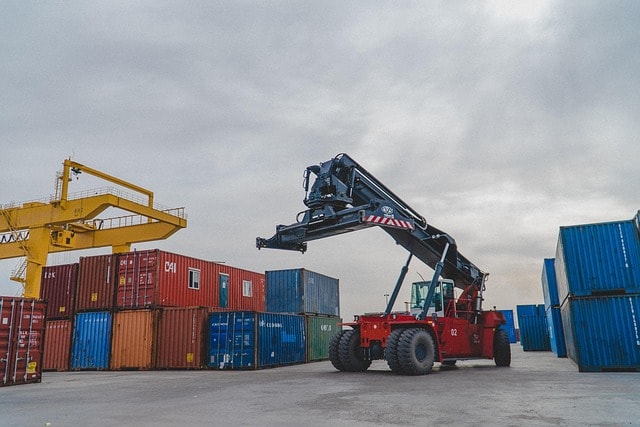
Material Handling & Logistics
Forklifts, automated guided vehicles (AGVs), and pallet jacks utilize deep-cycle lead-acid or Li-ion packs for all-shift operations. These industrial batteries are also ideal for warehousing environments, providing reliable power for heavy-duty applications.
Uninterruptible Power Supplies (UPS)
Data centers, telecom sites, and hospitals rely on industrial batteries to bridge mains outages and support critical loads. Selecting the appropriate battery technology is crucial for maintaining continuous functionality without interruption.
Renewable Energy Storage
Grid-scale Li-ion and flow batteries store solar and wind generation, smoothing output and enhancing grid resilience.
Energy storage systems are becoming increasingly vital in the industrial sector, providing a reliable and efficient source of power solutions for both motive power and stationary power systems. Lithium-ion batteries, in particular, are at the forefront of this revolution, offering numerous benefits that help companies reduce their reliance on traditional energy sources and lower their energy costs.
These advanced energy storage systems improve power quality, reduce downtime, and boost productivity, making them indispensable in modern industrial operations. Companies like EnerSys are leading the charge in this field, offering a range of solutions tailored to meet the diverse needs of industrial customers. Battery innovations are also critical to meet the growing demands of the data center industry by 2025, ensuring reliable and efficient power solutions for these energy-intensive facilities.
Energy storage systems can be customized to fit specific industrial applications, whether it’s for motive power, stationary power, or renewable energy systems. By integrating these systems, businesses can ensure a reliable and efficient power supply, enhancing overall operational efficiency and productivity. The ability to tailor these solutions to specific needs further underscores their value, making them a critical component of the future of industrial power solutions. These renewable energy storage solutions are designed to benefit both current and future conditions, ensuring a sustainable tomorrow.
Off-Highway Vehicles
Construction machinery and agricultural equipment demand high-power traction batteries for transportation to deliver reliable torque and runtime in remote locations. Industrial batteries are essential for powering off-highway vehicles, providing reliable torque and runtime.
Motive Power Batteries
Motive power batteries, along with various accessories, are the backbone of many industrial operations, providing reliable and efficient power for electric vehicles such as forklifts, pallet jacks, and other essential equipment. These batteries are engineered to endure the rigorous demands of heavy-duty applications, boasting high cycle life and deep discharge capabilities.
Among the various types of motive power batteries, lithium-ion batteries stand out for their high performance, long life, and minimal maintenance requirements. These batteries charge faster and last longer than traditional lead-acid batteries, offering superior performance and efficiency. On the other hand, lead-acid batteries remain a cost-effective option, known for their durability and robust performance in demanding environments.
To ensure optimal performance and extend the life of motive power batteries, regular maintenance is crucial. This includes proper charging and watering practices, which help maintain the battery’s health and efficiency. By adhering to these maintenance routines, businesses can maximize the reliability and longevity of their motive power batteries, ensuring uninterrupted operation and productivity. Our passion for maintaining operational efficiency and commitment to innovative energy solutions drives us to provide the best power solutions across various industries.
Benefits of Using Industrial Batteries
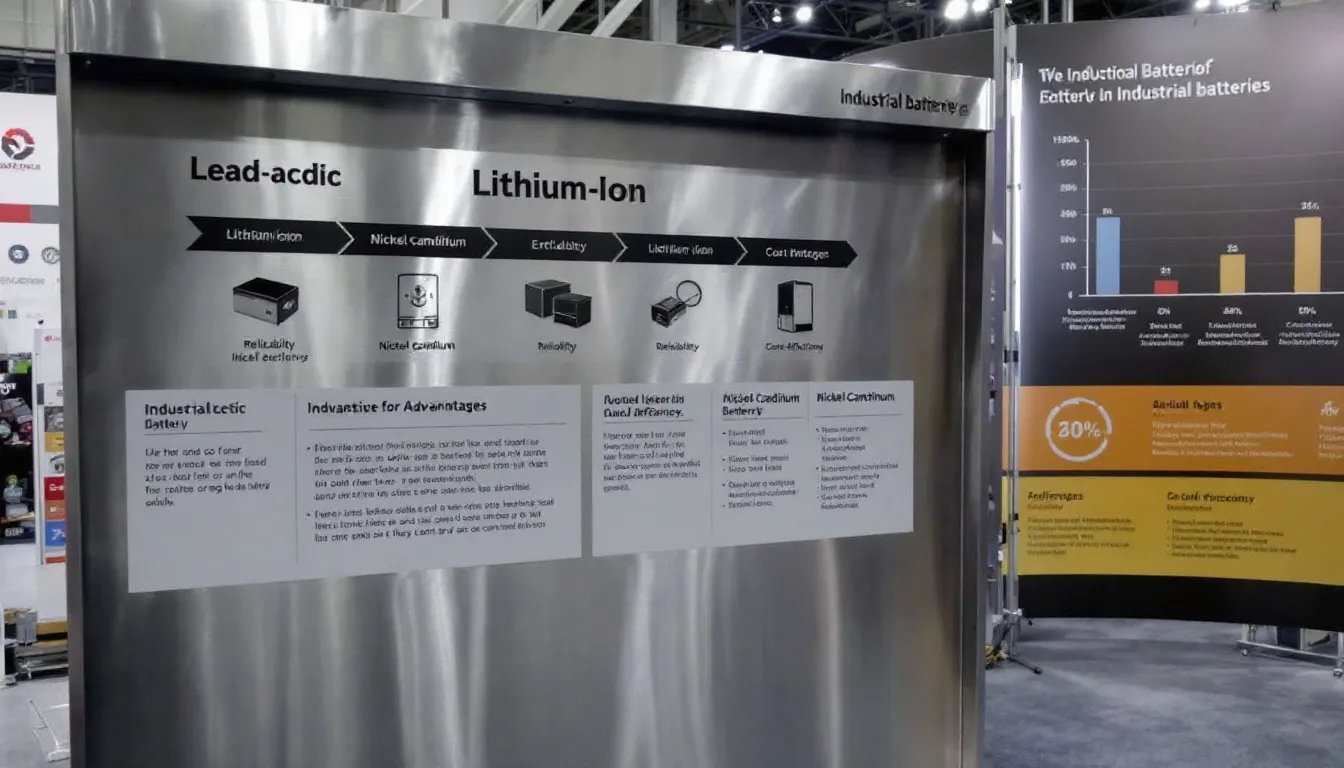
- Lower Total Cost of Ownership: Longer cycle life and reduced maintenance yield lower lifecycle costs compared to disposable or consumer cells.
- Enhanced Safety: Built-in thermal management, overcurrent protection, and robust enclosures mitigate risks of thermal runaway and leaks.
- Scalability & Modularity: Rack-mount and modular pack designs allow capacity expansion and simplified replacement without system downtime.
- Environmental Sustainability: Rechargeable systems reduce waste and, when paired with renewables, lower carbon footprints of industrial operations.
- Global Leadership: As a global leader in stored energy solutions, we continuously innovate to meet the evolving needs of our customers, ensuring they benefit from the latest advancements in industrial battery technology.
Selecting the Right Industrial Battery
When choosing an industrial battery, evaluate:
- Duty Cycle: Continuous vs. intermittent loads dictate chemistry and cell size.
- Environmental Conditions: Temperature extremes, humidity, and vibration levels guide casing and chemistry choice.
- Maintenance Requirements: Low-maintenance sealed chemistries (e.g., AGM, Li-ion) can reduce labor and downtime.
- Regulatory & Safety Standards: Compliance with UL, IEC, and transport regulations ensures uninterrupted market access.
- Total Cost of Ownership: Factor in purchase price, energy efficiency, replacement intervals, and disposal or recycling costs.
Expertise in battery technology is crucial for selecting the right industrial battery.
Custom Industrial Battery Solutions
In the realm of industrial power needs, one size does not fit all. Custom motive power battery and charger solutions are designed to meet the specific requirements of various industrial applications, including Class I, II, and III trucks. Companies like HAWKER offer a diverse range of products, from traditional flooded lead-acid batteries to advanced Thin Plate Pure Lead (TPPL) batteries and cutting-edge lithium batteries.
Custom solutions go beyond just the batteries themselves. They encompass high-frequency modular chargers, data management tools, and a variety of accessories that optimize battery performance and efficiency. These tailored solutions are developed by experienced teams who work closely with customers to understand their unique needs and operational challenges.
By investing in custom solutions, businesses can achieve real cost savings and enhanced productivity. These solutions not only provide reliable and efficient power but also streamline daily operations, making them more effective and efficient. Additionally, custom energy storage systems, such as lithium-ion batteries, offer a dependable power source for industrial equipment, further enhancing operational reliability and performance. Comprehensive services are also offered to ensure operational efficiency and customer satisfaction through expert solutions.
Conclusion
Industrial batteries are the backbone of modern power-critical operations, delivering reliability, safety, and cost efficiency across sectors. To identify the optimal solution for your customers’ application—whether material handling, energy storage, or heavy machinery—partner with a specialized battery provider offering end-to-end design, testing, and lifecycle support.
Ready to upgrade your power system? Contact our experts today for a customized feasibility study and see how the right industrial battery can transform your operations.
Our commitment to providing energy solutions extends to a changing world, highlighting our global impact and proactive approach in adapting to global energy demands and innovations.





